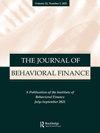投资者情绪和估值不确定性在分析师建议变化中的作用:来自美国公司的证据
IF 1.2
3区 经济学
Q3 BUSINESS, FINANCE
引用次数: 3
摘要
摘要本文研究了美国公司投资者情绪、估值不确定性和分析师推荐决策变更公告之间的实证关系。最近的行为金融学证据表明,市场情绪具有预测内容,影响分析师建议和股票回报动态之间的经典关系。与此证据相反,作者发现,在检查共识建议升级或降级的可能性时,估值不确定性的程度与投资者情绪的影响有关。虽然投资者情绪并没有完全消除高估值不确定性下的显著投资者情绪效应,但投资者情绪并不能有力地解释低估值不确定性下股市对分析师推荐变化的反应。此外,作者表明,如果估值不确定性很大,指的是市场竞争激烈,分析师的建议提供了重要的买入或卖出信号。然而,在竞争不那么激烈的市场中,分析师报告的信息量会减少。总体而言,作者证明了估值不确定性的大小是进一步理解分析师建议的投资者情绪的重要补充。本文章由计算机程序翻译,如有差异,请以英文原文为准。
The Role of Investor Sentiment and Valuation Uncertainty in the Changes around Analyst Recommendations: Evidence from U.S. Firms
Abstract The authors investigate the empirical relation among investor sentiment, valuation uncertainty, and announcements of changes in analyst recommendation decisions among U.S. firms. Recent behavioral finance evidence shows market sentiment to have predictive content that affects the classical relationship between analyst recommendations and stock return dynamics. Contrary to this evidence, the authors find that degree of valuation uncertainty is associated to the impact of investor sentiment when examining a likelihood of consensus recommendation upgrade or downgrade. While not totally eliminating the significant investor sentiment effect under high valuation uncertainty, the investor sentiment does not powerfully explain the stock market reactions to analyst recommendation changes under low valuation uncertainty. Furthermore, the authors show that analyst recommendations provide significant buy or sell signals if valuation uncertainty is great, referring to the market being highly competitive. However, in less competitive markets, analyst reports become less informative. Overall, the authors demonstrate that magnitude of valuation uncertainty is an important complement to investor sentiment for further understanding analyst recommendations.
求助全文
通过发布文献求助,成功后即可免费获取论文全文。
去求助
来源期刊

Journal of Behavioral Finance
Multiple-
CiteScore
4.60
自引率
10.50%
发文量
34
期刊介绍:
In Journal of Behavioral Finance , leaders in many fields are brought together to address the implications of current work on individual and group emotion, cognition, and action for the behavior of investment markets. They include specialists in personality, social, and clinical psychology; psychiatry; organizational behavior; accounting; marketing; sociology; anthropology; behavioral economics; finance; and the multidisciplinary study of judgment and decision making. The journal will foster debate among groups who have keen insights into the behavioral patterns of markets but have not historically published in the more traditional financial and economic journals. Further, it will stimulate new interdisciplinary research and theory that will build a body of knowledge about the psychological influences on investment market fluctuations. The most obvious benefit will be a new understanding of investment markets that can greatly improve investment decision making. Another benefit will be the opportunity for behavioral scientists to expand the scope of their studies via the use of the enormous databases that document behavior in investment markets.
 求助内容:
求助内容: 应助结果提醒方式:
应助结果提醒方式:


